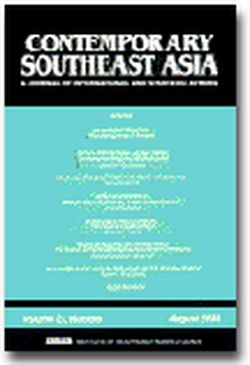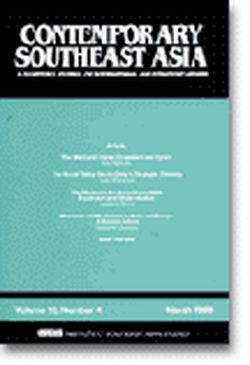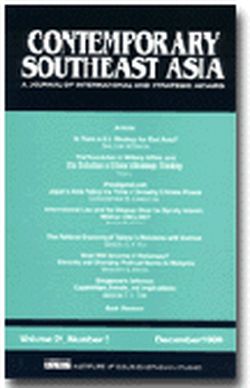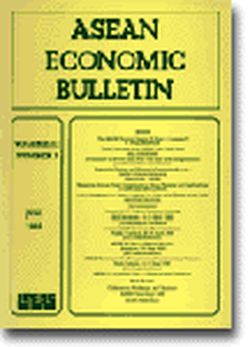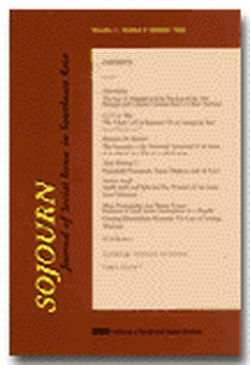Contemporary Southeast Asia: A Journal of International and Strategic Affairs Vol. 20/3 (Dec 1998)
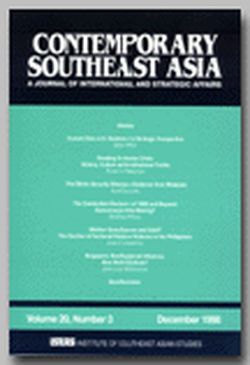
Date of publication:
December 1998
Number of pages:
126
Code:
CS20/3
Contents
-
Preliminary Pages
-
Current Sino-U.S. Relations in Strategic Perspective, by Denny C Roy, contributor see abstractU.S.-China relations since President Bill ClintonâÂÂs visit to China in June 1998 have seen a modest improvement. But from a deeper, strategic perspective, the relationship has undergone no fundamental change. The summit did yield significant results, most notably a minor U.S. concession regarding Taiwan. The rhetoric of a âÂÂstrategic partnershipâÂÂ, however, is largely empty. Areas of common ground between the two countries are equalled if not outweighed by divergences on a number of specific political issues as well as on the nature of the international system itself. A truly major improvement in Sino-U.S. relations would probably require either an alliance between Washington and Beijing against a threatening third party or major steps towards political liberalization in China. In the meantime, the possibility of another crisis persists.
-
Reading the Asian Crisis: History, Culture and Institutional Truths, by Peter W Preston , contributor see abstractThe Asian financial crisis has drawn different intellectual responses as to its causes. At one extreme, advocates of the U.S.-style liberal market system have blamed the political and business èlites of the region whom they have accused of âÂÂcrony capitalismâÂÂ. In reply, advocates of the particularity of the development experience of Asia have spoken of a Western politico-financial conspiracy to undermine AsiaâÂÂs success. However, a more detached social scientific perspective can offer a deeper insight into the crisis. Three areas of political-sociological reflection upon the Asian crisis may be considered: (i) the historical sociology of the development experience of the countries of Pacific Asia, (ii) the political sociology of political and policy analytic debate, and (iii) the political sociology of the production and legitimation of institutional truths.
-
The Ethnic Security Dilemma: Evidence from Malaysia, by Alan Collins, contributor see abstractIn the aftermath of the Cold War, the security literature has increasingly become focused on problems within states. This has led a number of scholars to apply ideas traditionally associated with international security to internal security issues. One such case concerns the application of the security dilemma to ethnic tensions. This article considers this application with reference to Malaysia and argues that not only can the security dilemma be applied, but that the coalition regime and the notion of Bangsa Malaysia represent the types of power-sharing and ethnic reconstruction which can mitigate and ultimately escape the security dilemma.
-
The Cambodian Elections of 1998 and Beyond: Democracy in the Making?, by Sorpong Peou, contributor see abstractThe Cambodian elections of July 1998 sparked controversy over the issue of âfreenessâ, âfairnessâ, and âcredibilityâ. For some, it marked a new beginning in Cambodian politics: the country successfully managed to organize elections without foreign intervention, as had happened in 1993. For others, the rule of law has not prevailed over the rule of thumb. The electoral game has worked to the ruling partyâs advantage. Although the elections took place, the future of liberal democracy in Cambodia remains precarious. Among the major obstacles to democratic maturation are ideological conflict between the major contending parties, anti-democratic cultural values, and asymmetrical power relations among the political factions. With the Cambodian Peopleâs Party dominating the stateâs power structure, the politics of accommodation is unlikely to prevail.
-
Whither Guns, Goons, and Gold? The Decline of Factional Election Violence in the Philippines, by John L Linantud, contributor see abstractThis article examines the decline of non-ideological factional violence in Philippine elections since 1986. The factors responsible for past violence â political clans, a weak state, social disorder, and a confrontational political subculture â have not changed enough to account for safer elections. Instead, the emergence of the military and church is the biggest change in politics since martial law. Due to the rise of the military and church, civilians no longer dominate politics as they once did, and factional poll violence has declined. Election violence, however, is still a serious problem. Church participation is of particular importance for democratic consolidation because it institutionalizes non-violent participation. But without economic modernization, politics will remain desperate, and elections will require extensive church and military deployments to minimize bloodshed.
-
Singapore: New Regional Influence, New World Outlook?, by Jean-Louis Margolin, contributor see abstractUntil the late 1980s, Singaporeâs foreign policy appeared cautious, reactive, and somewhat cynical. It was mainly the formalization of immediate interests: security in a dangerous region, and economic development through international opening. Hence, it constituted a âdiplomacy of weaknessâ, aimed at avoiding direct conflicts, and acquiring the goodwill of the great powers. More recently, however, Singaporeâs general outlook has been changing, it is now more global, more multilateral, and more open to ideological and normative considerations. It remains to be seen if the new opportunities offered by an enhanced international status will be accompanied by an acknowledgment of the new responsibilities befitting a relatively affluent country that happens to be the communications hub and economic powerhouse of an important region. Current difficult economic times call for decisive answers.
- BOOK REVIEWS
-
BOOK REVIEW: The Environment and Security in Pacific Asia, by Alan Dupont, by Michael Wesley, contributor
-
BOOK REVIEW: Taiwan and Chinese Nationalism: National Identity and Status in International Society, by Christopher Hughes
-
BOOK REVIEW: Business, Markets and Government in the Asia Pacific, edited by Rong-I Wu and Yun-Peng Chu, by Xavier Furtado, contributor

